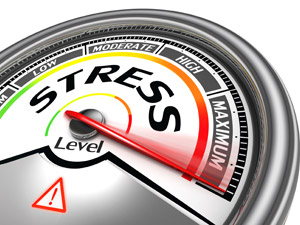April is Stress Awareness Month. The connection between stress and body weight is deeply rooted in both biology and psychology. When stress takes over, it doesn’t just affect your mind—it impacts your body, your cravings, and your ability to lose weight.
Let’s unpack how stress influences weight and, more importantly, what you can do to break free from its grip.
The Science Behind Stress and Weight Gain
Back when our ancestors were dodging wild animals, stress was temporary. A quick burst of cortisol gave them the energy to escape, and then levels dropped.
Fast forward to today, and that same system is overloaded—emails, bills, life stress; it all keeps cortisol high.
Studies, Journal of Obesity (2012), have shown the result:
- Stress triggers cortisol, which increases appetite
- Cortisol is your body’s primary stress hormone, and when levels stay high for too long, it signals your body to store fat. This happens because your brain thinks you’re in a crisis and might need extra energy to survive.
- Stress makes you crave high-calorie, high-sugar foods
- Ever noticed that when you’re stressed, you don’t crave broccoli? Studies show that stress shifts our food preferences, making us reach for quick-energy comfort foods like sugary snacks and processed carbs. This happens because these foods trigger the brain’s reward system, offering temporary relief—but at the cost of weight gain.
- Stress disrupts sleep, and poor sleep leads to weight gain
- When you’re stressed, you may struggle to fall asleep or stay asleep. Poor sleep impacts hunger hormones, making you more likely to overeat and crave the wrong foods the next day. Research has linked chronic stress to emotional eating and binge cycles, both of which make weight loss more difficult.
- Stress can lead to a loss of control around food
- For many, stress is a major trigger for emotional eating. This is especially true for those who have spent years relying on strict dietary restraint to manage their weight. Studies show that when high-restraint eaters experience stress, they tend to lose control and overeat, leading to guilt and frustration.
How to Take Back Control: Practical Strategies to Reduce Stress
- Activate Your Relaxation Response with the Chillpod
- One of the fastest ways to counteract stress hormones is to trigger the body’s relaxation response—the opposite of fight-or-flight mode. That’s where the Chillpod comes in.
- What is the Chillpod? It’s the pod we include from the very first week of my 12 week Slimpod programme (and free trial). It aims to reduce stress and anxiety, which in turn helps with weight loss.
- How does it help? It uses neuroscience-backed techniques to rewire your brain’s response to stress, making you feel calmer and more in control.
- When should you use it? Anytime stress levels are high (exept from driving)—after a tough day, before bed, or when you feel overwhelmed and tempted to turn to food.
- Move Your Body – But Make It Enjoyable
- Exercise is one of the best stress-busters, but the key is to move in a way that feels good rather than forcing yourself into a workout you dread. Here are some suggestions:
- Studies show, Sage journal (2018), Walking in nature lowers cortisol levels and improve mood and resilience a 20-minute walk outside can make a huge difference in stress and cravings.
- Gentle movement like yoga or stretching can switch your body from stress mode to relaxation mode, reducing emotional eating triggers.
- Strength training and cardio can help burn off excess cortisol and improve sleep, which supports weight loss.
- Join in our move and groove Monday challenges in the private facebook group and dance to your favourite song!
- Take Back Control with Small Wins
- Stress often makes us feel out of control, and that lack of control can lead to binge eating or poor food choices. The antidote? Taking small, manageable actions every day.
- Keep a success journal – Write down three small wins each day. This could be choosing a healthy snack, taking a deep breath before eating, or recognising when you’re stressed.
- Prioritise “me time” – Even 10 minutes a day of doing something just for you (reading, listening to music, or a short walk) can retrain your brain to handle stress in a healthier way.
- Breathe before you eat – If you feel stress cravings coming on, take five deep breaths before making a food choice. This activates the parasympathetic nervous system, reducing stress-driven eating.
- Improve Your Sleep to Lower Stress and Cortisol
- Since poor sleep worsens stress and weight gain, making sleep a priority is one of the best things you can do for weight loss.
- Use Chillpod at bedtime to help calm the nervous system and improve sleep quality.
- Create a sleep routine – Try switching off screens an hour before bed and winding down with a book, music, or a warm bath.
- Aim for consistency – Going to bed at the same time each night helps regulate hormones that control hunger and cravings.
Tools to help you take back control
If stress has been controlling your eating habits and making weight loss feel impossible, The Weight’s Over – Take Back Control can help you break free. This book dives deeper into why stress triggers cravings, how to stop emotional eating, and the mindset shifts that put you back in control. It’s time to work with your brain, not against it, and create lasting change—without guilt or restriction.
Ready to take back control? Get your copy today at theweightsover.com
Final Thoughts: You Are in Control
Stress is a normal part of life, but it doesn’t have to control your eating habits or your weight. By using Chillpod, incorporating stress-busting activities, and focusing on small wins, you can take back control of your body and your mind.
This Stress Awareness Month, make a commitment to prioritise your wellbeing—not through restriction or willpower, but by working with your brain and body, not against them.
Which of these tips will you try first? Let me know in the comments!
Looking for inspiration?
Biddy thought she’d tried everything. Diets, willpower, self-control—nothing worked. But then she found Slimpod, and everything changed. Her story isn’t just about weight loss—it’s about freedom, confidence, and finally breaking free from the cycle of self-doubt.
Check out Biddy’s journey—and the other incredible stories in my book—of real people who transformed their lives with Slimpod.






1 thought on “How Stress Affects Weight Loss – And How to Take Back Control”
again this advice is an inspiration. I find the chill pod very good it is very calming.